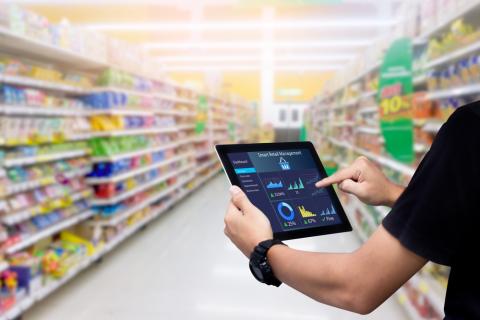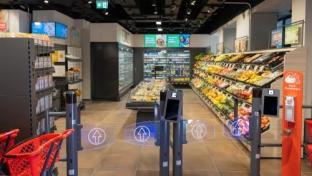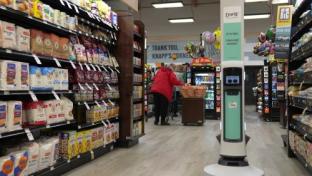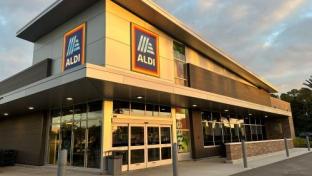Grocers Can Demonstrate Using AI for Good

As the U.S. Senate Judiciary Committee on Privacy, Technology and Law scrutinizes artificial-intelligence (AI) regulation, grocers play a pivotal role in providing transparency and clarity on the industry’s adoption of AI. Specifically, retailers can allay any growing fears as grocers accelerate the use of predictive and generative AI solutions.
The Senate committee notably met in late July and in the middle of May, interviewing experts in the field during those sessions, including Sam Altman, CEO of OpenAI; Dario Amodei, CEO of Anthropic; and Christina Montgomery, chief privacy and trust officer at IBM. The government’s concerns unsurprisingly focused largely on how to protect consumer privacy and jobs as AI increasingly finds its way across industries.
[Read more: "These 2 Retailers Are Projected to See Biggest Financial Impact From Generative AI"]
Innovative grocers can help as they embody use cases that provide beneficial insights. For example, the industry employs more than 52 million people in the United States, representing the largest private-sector employer in the economy, according to the National Retail Federation. Secondly, grocers are increasingly adopting generative AI solutions. Here, the industry can highlight the technology’s role in innovation, show how AI is an advantage both for shoppers and store associates, and answer core questions about AI.
Will AI Replace Jobs?
From the grocery sector’s point of view, AI has been an asset in each aspect of end-to-end operations using diverse data sources to drive modeling and predicting demand forecasts down to the store and item level. The technology is used to generate optimal promotions, prevent stockouts and ensure correct item placements for planogram compliance. Further, each step of the way, AI has proved that rather than displacing employees, it’s enhancing their productivity.
This is a key point: Across a synchronized data-driven retail organization, AI can be used to help deliver stronger insights to help key people in key roles make better, more agile decisions. AI learns from data and directives as category managers use it – for example, as they review recommendations and run what-if scenarios. Using carefully curated data sources and having skilled workers in oversight roles help ensure that AI recommendations are accurate and actionable.
Is AI a Threat to Consumer Privacy?
Consumers want a more personalized shopping experience. They want to go to a supermarket five blocks from their home and feel as though the store knows their likes and dislikes. To deliver a customer-centric store shelf that understands the shopping behaviors of a direct community, transformational AI applications are paramount. Data, of course, fuels these applications, but delivering a personalized experience doesn’t need to require personally identifying shopper data.
AI solutions can aggregate loyalty card information, sales transaction data, third-party panel data and more, in a way that’s anonymized and responsible. The impact that AI-powered data has on delivering a personalized feel to a store is a tremendous asset for consumers. Targeted insights help food retailers efficiently stock the items that directly meet their consumers’ needs.
That said, grocers and retailers need to be transparent with consumers about how they’re using AI. There are growing applications of generative AI, for example, that directly affect consumers. Instacart has revealed a partnership with OpenAI that uses AI-powered recommendations and powerful language models to help consumers build shopping lists. The company is transparent with consumers opting into the service that it’s a generative AI tool, providing honesty to gain trust from consumers.
Can Grocers Become Blinded by AI?
In addition to transparency, there are important considerations for the retail industry before using AI. Grocers, as mentioned, have been working with AI technology for years to run effective supply chains, marketing campaigns and category plans that increase profits and ensure optimal item mix and stock levels.
But, as the technology evolves into use cases with generative AI, grocers should take steps toward identifying solutions that provide tangible benefit while responsibly managing risk:
- Identify the right problems to solve with generative AI. The technology is most effective in delivering huge productivity gains for repetitive tasks, creating relevant content and documentation based on curated sources that reduce time-consuming manual effort by humans.
- Seek solutions crafted for the grocery industry. AI solutions work best overall when tuned into the nuances of business verticals and their specific requirements from start to finish. The technology should be trained on large language models with targeted, trustworthy content and be engineered to transform productivity for specific roles, such as replenishment planners, category managers and store managers.
- Seek a technology provider committed to responsible enterprise AI development. The value of generative AI depends on integrity, rigor, domain expertise and transparency.
Building a Brighter Future for Grocery
At the end of the day, predictive and generative AI in grocery delivers shopper-centric success, ensuring that the right items are available to the right shoppers at the right time in the right channels.
When done right by delivering consistent, superior shopper experiences, the end-to-end AI approach ensures improved engagement and loyalty, which translates to improved business results.






